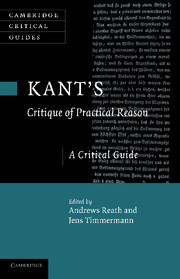Book contents
- Frontmatter
- Contents
- Preface
- List of contributors
- Translations and abbreviations
- Introduction
- 1 The origin and aim of Kant's Critique of Practical Reason
- 2 Formal principles and the form of a law
- 3 Moral consciousness and the ‘fact of reason’
- 4 Reversal or retreat? Kant's deductions of freedom and morality
- 5 The Triebfeder of pure practical reason
- 6 Two conceptions of compatibilism in the Critical Elucidation
- 7 The Antinomy of Practical Reason: reason, the unconditioned and the highest good
- 8 The primacy of practical reason and the idea of a practical postulate
- 9 The meaning of the Critique of Practical Reason for moral beings: the Doctrine of Method of Pure Practical Reason
- Bibliography
- Index
5 - The Triebfeder of pure practical reason
Published online by Cambridge University Press: 06 August 2010
- Frontmatter
- Contents
- Preface
- List of contributors
- Translations and abbreviations
- Introduction
- 1 The origin and aim of Kant's Critique of Practical Reason
- 2 Formal principles and the form of a law
- 3 Moral consciousness and the ‘fact of reason’
- 4 Reversal or retreat? Kant's deductions of freedom and morality
- 5 The Triebfeder of pure practical reason
- 6 Two conceptions of compatibilism in the Critical Elucidation
- 7 The Antinomy of Practical Reason: reason, the unconditioned and the highest good
- 8 The primacy of practical reason and the idea of a practical postulate
- 9 The meaning of the Critique of Practical Reason for moral beings: the Doctrine of Method of Pure Practical Reason
- Bibliography
- Index
Summary
At the beginning of the Critique of Practical Reason, Kant tells us that its aim is merely to show that there is pure practical reason, or that pure reason is practical. It won't, however, be by an analytical argument that this task is discharged: if pure reason is actually practical, he adds, ‘it proves its reality and that of its concepts through the act [durch die Tat]’ (CpV 5:3). Though somewhat cryptic, this remark anticipates the doctrine of the Factum der Vernunft – the ‘fact’ of reason – presented in Chapter I of the Analytic of Pure Practical Reason, where Kant explicitly denies that the proposition that pure reason is practical can be demonstrated from antecedently available premises (CpV 5:31). Recognizing that pure reason's practicality cannot be established by conceptual argument, Kant endeavours instead to employ such argument to reach a position from which we can gain a philosophical recognition of this practicality – this act – of pure reason, a recognition based in the consciousness of the fundamental law of pure practical reason, a law we have recognized all along, under another name, as the moral law.
But Kant also denies that this Factum is an empirical fact. While we cannot establish pure reason's practicality by conceptual argument, neither is it through any ‘experience’ of this practicality that we first recognize the moral law. If it were by such means that we came to know this principle, it would have to be through a receptive capacity.
- Type
- Chapter
- Information
- Kant's 'Critique of Practical Reason'A Critical Guide, pp. 90 - 118Publisher: Cambridge University PressPrint publication year: 2010
- 13
- Cited by

